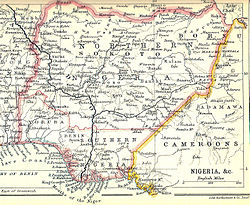
Back Colònia de Lagos Catalan Lagos (Kolonie) German Lagosa Kolonio Esperanto Colonia de Lagos Spanish Lagosin siirtomaa Finnish Colonie de Lagos French Koloni Lagos ID Lagos Colony IG ラゴス植民地 Japanese Colônia de Lagos Portuguese
Lagos Colony and Protectorate | |||||||||
|---|---|---|---|---|---|---|---|---|---|
| 1862–1906 | |||||||||
 | |||||||||
| Capital | Lagos | ||||||||
| Official languages | English | ||||||||
| Government | British Colony | ||||||||
| History | |||||||||
• Established | 5 March 1862 | ||||||||
• Disestablished | 28 February 1906 | ||||||||
| |||||||||
| Today part of | Nigeria | ||||||||
Lagos Colony was a British colonial possession centred on the port of Lagos in what is now southern Nigeria. Lagos was annexed on 6 August 1861 under the threat of force by Commander Beddingfield of HMS Prometheus who was accompanied by the Acting British Consul, William McCoskry. Oba Dosunmu of Lagos (spelled "Docemo" in British documents) resisted the cession for 11 days while facing the threat of violence on Lagos and its people, but capitulated and signed the Lagos Treaty of Cession.[1] Lagos was declared a colony on 5 March 1862.[2] By 1872, Lagos was a cosmopolitan trading centre with a population over 60,000.[3] In the aftermath of prolonged wars between the mainland Yoruba states, the colony established a protectorate over most of Yorubaland between 1890 and 1897.[4] The protectorate was incorporated into the new Southern Nigeria Protectorate in February 1906, and Lagos became the capital of the Protectorate of Nigeria in January 1914.[2] Since then, Lagos has grown to become the largest city in West Africa, with an estimated metropolitan population of over 9,000,000 as of 2011.[5]
- ^ Elebute, Adeyemo (2013). The Life of James Pinson Labulo Davies: A Colossus of Victorian Lagos. Kachifo Limited/Prestige. pp. 143–145. ISBN 9789785205763.
- ^ a b Worldstatesmen.
- ^ Higman 1879, pp. 70.
- ^ Dupuy.
- ^ City Mayors.

